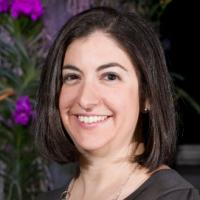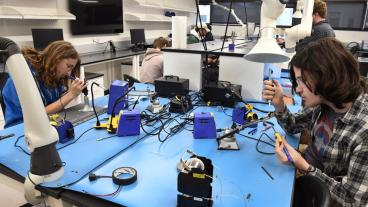Trefny Center celebrates 10 years of transformative teaching support
Center provides faculty resources to improve learning experience, outcomes for Mines students

The Trefny Innovative Instruction Center is celebrating a decade of continuously advancing and improving the quality of instruction at Colorado School of Mines.
Through intensives and fellowships, individual consultations, workshops and more, hundreds of Mines faculty members have engaged with the center – and, in turn, positively impacted thousands of Mines students through improved course design, clear learning outcomes, aligned and authentic assessments and engaging learning pathways.
“The mission of the Trefny Center is to inspire transformative teaching and learning,” said Megan Sanders, director of the center. “Our goals are aligned with the core work of Mines – helping our faculty teach in innovative ways.”
The Trefny Center has gone by several names in its history. It was first known as the Center for Engineering Education when it was founded in 2000 with the support of then-Vice President of Academic Affairs John Trefny. After Trefny was named the 15th President of Mines in 2001, he and his wife, Sharon, a retired systems engineer, gave a generous gift to start an endowment for the center.
Later, when John Trefny retired as President in 2006, the center was renamed the Trefny Institute in honor of John and Sharon’s many contributions to Mines. In 2015, the center renewed it focus, becoming the Trefny Innovative Instruction Center as it is still known today. In that sense, 2025 marks both the 10-year anniversary of the Trefny Center but also the 25-year anniversary of the original Center for Engineering Education, the genesis of a cohesive effort to advance teaching education at Mines.
“Sharon and I have been very pleased by the growth of the center over the past decade and the role it has assumed to keep pace with, or even lead in, educational developments,” John Trefny said. “We hope that the center will continue to prove Mines’ dedication to teaching and learning. The efforts of the center and everyone involved will be more than ever needed to maintain leadership in a world of rapid changes.”
From the beginning, the hallmark of the center’s work has been the Engineering Learning framework, an approach to course design and implementation that shifts the focus from “covering content” to creating engaging, inclusive and effective learning experiences. With funding from the Mines Board of Trustees, the first major initiative of the Trefny Innovative Instruction Center was to immerse cohorts of faculty in the framework through summer intensives.
More than 150 Mines faculty member have gone through these intensive learning experiences – just one of the center’s many offerings for faculty engagement – since the first Engineering Learning Summer Intensive in 2016.
“It was amazing to see the changes in how faculty approached their teaching after participating in the summer intensives, taking it from being instructor-centered, where faculty lecture and solve problems on a board, to focused on student engagement and facilitating the learning experience,” Sanders said.
Today, the Trefny Center’s mission focuses on four areas: Teaching and Learning, University Leadership, Education Research and Community. The center’s signature initiatives include intensives focused on course design, individual consultations, and workshop series on emerging topics like generative AI. The Trefny Center team is made up of assessment experts, faculty developers and education researchers.
“One of the things that’s amazing about how our teaching center is set up at Mines is that we’re involved in larger conversations about teaching on campus. We’re set up to have a broader impact,” Sanders said.
One service the center offers to assist faculty in making meaningful change during the semester is Early Course Feedback. A Trefny Center faculty developer collects feedback from students about their experience in class and works with the faculty member to identify adjustments and incorporate student suggestions – as the course is happening. The center also supports graduate students with a campus-wide New TA Orientation, as well as a yearlong College Teaching Certificate Program and Graduate Teaching Fellowship, which provide graduate students with hands-on teaching experience, mentorship and professional development while they work on their graduate degrees at Mines.
The center’s impacts are felt beyond Mines as well. Faculty collaborate with the Trefny Center on research that shows the impact of the teaching and learning going on at Mines, which has resulted in $5 million in successful Trefny-supported grant proposals, as well as dozens of presentations and publications. Working with the Office of Global Initiatives and Business Development, the center has also designed and delivered teacher training programs for use at partner institutions around the world. And in 2023, the center led the development of guidelines for using generative AI in the classroom, which have been cited by institutions worldwide.
“It’s been exciting to see the campus culture shift over the years,” Sanders said. “We see more faculty engaged in their teaching, reading the literature and talking to each other. Cross-department conversations about teaching are happening and we’re seeing evidence of faculty stepping into new roles as teaching experts on campus.”
Sanders is the third director of the Trefny Innovative Instruction Center. She took on the role in June 2024 following the retirement of Deb Jordan, who served from 2021 to 2024. Sam Spiegel led the center from 2015 to 2021, leaving the Trefny Center to become Mines’ Assistant Vice President for Online.
In the Trefny Center’s future is expansion of the impactful work that has defined the last 10 years, with a focus on increasing student involvement in their offerings. Having Mines students included as consultants for faculty fellowship programs and facilitating more dialogue between faculty and students is a center priority.
“We want to look at more ways to bring students into the conversation,” Sanders said. “Ultimately, they’re the folks who we want to impact through our work with faculty. Our students are so thoughtful and intentional about their learning, and they are an important part of our broader future direction.”




